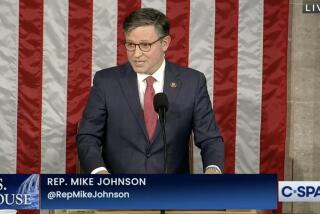Bush Urges an End to Attacks on Plan
- Share via
ALBUQUERQUE — At the start of a potentially crucial congressional recess, in which lawmakers will hear from constituents about President Bush’s plans to overhaul Social Security, Bush and his allies asked Democrats and AARP on Tuesday to stop attacking their ideas.
Bush issued the plea alongside his onetime rival for the presidency Sen. John McCain (R-Ariz.), who has a better working relationship with Democrats than does the White House.
“I believe there will be a bad political consequence for people who are unwilling to sit down and talk about the issue,” Bush told supporters during one of his “conversations” on Social Security, appearing with McCain and New Mexico’s Republican senator, Pete V. Domenici. “I think the American people expect people from both parties to stand up and take the lead and solve this issue.”
McCain, who was with Bush on Monday and Tuesday for a swing through New Mexico, Arizona and Colorado, pointedly addressed AARP, the 35-million-member lobby that has galvanized opposition to Bush’s plans among seniors. Choosing his words carefully, McCain accused opponents of wanting to wait on developing a financial fix for the system until 2042 -- the year its reserve funds are projected to be depleted, leaving it with more financial obligations than money.
“I want to say to our friends in the AARP -- and they are my friends: Come to the table with us,” McCain said. “We not only have an obligation to seniors, but we have an obligation to future generations.”
His remarks, which echoed statements made Monday by Vice President Dick Cheney and House Ways and Means Committee Chairman Bill Thomas (R-Bakersfield), reflected a recognition by White House strategists that unified Democratic opposition to the Bush-backed overhaul and the continued popularity of AARP are contributing to a decline in public opinion on the president’s handling of Social Security.
Bush wants to let workers born after 1950 divert a portion of their payroll taxes into individual, privately managed retirement accounts invested in stocks and bonds. In return, workers would have to accept a cut in the traditional Social Security benefit.
Bush concedes that the accounts alone would not solve the retirement system’s problem in handling the coming wave of baby boomer retirements. But he casts the accounts as part of a larger plan, which has not yet been spelled out, to shore up the system’s shaky finances.
Opponents charge that creating private accounts would drain money from the system, putting current and future beneficiaries at risk while leaving them vulnerable to the vagaries of the stock market. Critics also disagree with Bush’s claim that the system will soon be in crisis. They suggest that only minor fixes are required, such as adjusting benefits or raising payroll taxes.
An AARP official said McCain was wrong to suggest that the group wants to wait on a fix, but he added that private accounts were not a viable option.
“We share an interest in resolving this problem sooner rather than later, but we have pretty profound differences on how best to solve it,” said John Rother, AARP’s policy director. Of the group’s opposition to private accounts, he added: “We’re not budging on that.”
Tuesday’s conciliatory language by McCain was a stark contrast to efforts by another group that supports private accounts, USA Next, which recently launched a campaign to paint AARP as a liberal front group.
AARP backed Bush’s 2003 legislation creating a prescription drug program as part of Medicare. The organization remains popular and pervasive, and is a formidable opponent to the White House message machine.
AARP launched its third wave of advertising against the Bush plan over the weekend, with ads in newspapers and on radio and television nationwide. One features a plumber telling a woman that the only way to fix her clogged sink is to demolish her entire house, suggesting that Bush’s plans for Social Security are out of proportion to the problem.
The group claims that its members have made 500,000 contacts with Congress by phone and e-mail.
Bush, aware that such lobbying has left lawmakers wary of alienating seniors before the 2006 elections, has been traveling the country trying to convince older people that they don’t need to fear his plans and that he does not want to change anything for people born before 1950.
“A lot of people rely upon the check,” Bush said. “It’s an important part of their life. That’s why none of us want to put a system in place that touches that check. It’s essential that you hear that.”
More to Read
Get the L.A. Times Politics newsletter
Deeply reported insights into legislation, politics and policy from Sacramento, Washington and beyond. In your inbox twice per week.
You may occasionally receive promotional content from the Los Angeles Times.










